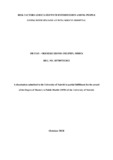Risk Factors Associated With Hypertension Among People Living With Hiv/aids at Pcea Kikuyu Hospital

View/
Date
2018Author
Ugo-Kereke, Ijeoma D
Type
ThesisLanguage
enMetadata
Show full item recordAbstract
Introduction: Hypertension is a non-infectious disease that has been shown to be the leading risk factor of cardiovascular disease and stroke. HIV on the other hand, is an infectious disease that is mainly sexually transmitted. Both conditions pose a big challenge to the public health sector due to their high morbidity and mortality. With the scale up of ART, the negative impacts of HIV/AIDS have been controlled, with little attention on hypertension in HIV. It has been observed that PLWHIV are at higher risk of the non-communicable disease comorbidities globally, especially the cardiovascular diseases. This may be due to the effects of ARVS, as well as the HIV in the body system. Hypertension as the leading cause of CVD recently has been found to have high incidence, as well as high prevalence among PLWHIV and AIDS with high morbidity and mortality.
Objectives: The purpose of this study was to assess the risk factors that are associated with hypertension among PLWHIV and AIDS patients at PCEA Kikuyu hospital.
Methodology: An analytical case control study was conducted in 90 hypertensive and 90 non-hypertensive PLWHIV/AIDS attending clinic at PCEA Kikuyu hospital during the month of November and December 2016.Those who participated in the study were randomly selected from the records and matched on categorical age. Hypertension was determined from participants who are already on care for HBP or with BP >140/90mmHg recorded in 2 to 3 times consecutively during the previous visits, and on anti-hypertensive medications which are documented in their files. Information was obtained by direct interview with questionnaires adopted from the WHO STEPS instrument for NCD risk factors surveillance. Knowledge, attitude and practices on hypertension were done by using 15 questions adopted from the international journal on KAP research work by Pregnesh et a, l 2014. Information was entered with the use of excel then exported to the Statistical Products and Service
xvi
Solution version 20.0 (SPSS) for analysis. The study strictly adhered to ethical standards as provided by the ethical research committee.
Results: It was found that the following were independently associated with hypertension and remained significant till the end of the study. Among the cases and controls, 74% and 53% were aged >40 years, hence, hypertensive patients had a significantly reduced odds of being aged ≤ 40 years (OR=0.3, C.I: 0.1-0.8, p=0.03). Those who are married were 87% cases and 73% controls respectively, and were 4.1 times likely to develop HBP than the unmarried, (OR=4.1, C.I: 1.2-14.4, p=0.02). Those who attended higher level of education (secondary and tertiary) were 41% cases and 67% controls respectively, hence those who attended tertiary level of education had a higher chances of developing hypertension than the secondary and the primary level of education (OR=0.09, C.I: 0.01-0.6, p=0.01). BMI was also found to be independently associated with hypertension with only 24% cases and 46% controls respectively having normal BMI, hence the obese were 4.8 times more likely to develop HPB than those who have normal BMI and the underweight. The knowledge that hypertensive take hypertensive drugs daily remained statistically significant (p=0.00) till the end of the study, with 36% and 69% among the cases and controls respectively, having the knowledge that hypertensive takes drugs daily. Generally, in terms of knowledge on hypertension, 61% and 67% of the cases and controls respectively demonstrated poor knowledge on hypertension, 72% and 67% of the cases and controls demonstrated positive attitude on hypertension, while only 49% and 35% of the cases and controls respectively demonstrated good practices on hypertension. However, sex, duration on HAART, viral load, lifestyle factors was not associated with hypertension.
Conclusion: Independent risk factors of hypertension were found to be age, level of education, BMI, marital status and knowledge on hypertensive daily drug intake. However, both the cases and controls were not knowledgeable with poor practices on hypertension.
xvii
Recommendation: In order to control the hypertension menace and avert the morbidity and mortality secondary to it and NCDs in general, a hypertension awareness programme should be incorporated into the HIV programme. The National government through the help of the development partners who are supporting the ongoing HIV programme should make available provision for free BP check to the members of the public for early detection, and control of high blood pressure, and NCD at large.
Publisher
University of Nairobi
Subject
Risk Factors Associated With Hypertension Among People Living With Hiv/aids at Pcea Kikuyu HospitalRights
Attribution-NonCommercial-NoDerivs 3.0 United StatesUsage Rights
http://creativecommons.org/licenses/by-nc-nd/3.0/us/Collections
- Faculty of Health Sciences (FHS) [4302]
- Theses & Dissertations [241]
The following license files are associated with this item:

